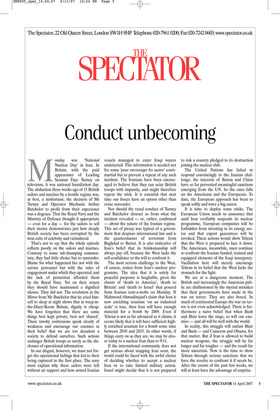Conduct unbecoming
Monday was ‘National Nuclear Day’ in Iran. In Britain, with the paid appearance of Leading Seaman Faye Turney on television, it was national humiliation day. The abduction three weeks ago of 15 British sailors and marines by a hostile regime was, at best, a misfortune; the decision of Ms Turney and Operator Mechanic Arthur Batchelor to profit from their experience was a disgrace. That the Royal Navy and the Ministry of Defence thought it appropriate — even for a day — for the sailors to sell their stories demonstrates just how deeply British society has been corrupted by the twin cults of celebrity and victimhood.
That’s not to say that the whole episode reflects poorly on the sailors and marines. Contrary to some tub-thumping commentary, they had little choice but to surrender. Blame for what happened lies not with the service personnel but with the rules of engagement under which they operated, and the lack of protection afforded them by the Royal Navy. Yet on their return they should have maintained a dignified silence. They did not. The revelation in the Mirror from Mr Batchelor that he cried himself to sleep at night shows that in weep-inthe-Diary-Room Britain, dignity is cheap. We have forgotten that there are some things best kept private, best not ‘shared’. These tawdry confessions speak clearly of weakness and encourage our enemies in their belief that we are too decadent a society to defend ourselves. Such actions endanger British troops as surely as the disclosure of operational information.
In our disgust, however, we must not forget the operational failings that led to their being captured in the first place. The navy must explain why these sailors were left without air support and how armed Iranian vessels managed to enter Iraqi waters undetected. This information is needed not for some ‘pour encourager les autres’ courtmartial but to prevent a repeat of any such incident. The Iranians have been encouraged to believe that they can seize British troops with impunity, and might therefore repeat the trick. It is essential that next time our forces have an option other than ovine surrender.
Nor should the venal conduct of Turney and Batchelor distract us from what the incident revealed — or, rather, confirmed — about the nature of the Iranian regime. This act of piracy was typical of a government that despises international law and is the quartermaster of terrorism from Baghdad to Beirut. It is also indicative of Iran’s belief that its brinksmanship will always pay off, because the West lacks the self-confidence or the will to confront it.
The most serious challenge to the West, of course, comes from Iran’s nuclear programme. The idea that it is solely for peaceful purposes is laughable, given the chants of ‘death to America’, ‘death to Britain’ and ‘death to Israel’ that poured from Iranian rent-a-mobs on Monday. If Mahmoud Ahmadinejad’s claim that Iran is now enriching uranium ‘on an industrial scale’ is true, then Iran will have enough material for a bomb by 2009. Even if Tehran is not as far advanced as it claims, it seems likely that it will have sufficient highly enriched uranium for a bomb some time between 2010 and 2015. In other words, if things carry on as they are, we may be closer today to a nuclear Iran than to 9/11.
If the international community does not get serious about stopping Iran soon, the world could be faced with the awful choice of deciding whether to accept a nuclear Iran or to take limited military action. Israel might decide that it is not prepared to risk a country pledged to its destruction joining the nuclear club.
The United Nations has failed to respond convincingly to the Iranian challenge; the interests of Russia and China have so far prevented meaningful sanctions emerging from the UN. So the onus falls on the Americans and the Europeans. To date, the European approach has been to speak softly and wave a big carrot.
It is time to deploy some sticks. The European Union needs to announce that until Iran verifiably suspends its nuclear programme, European companies will be forbidden from investing in its energy sector and that export guarantees will be revoked. These actions would show Tehran that the West is prepared to face it down. The Americans, meanwhile, must continue to confront the Iranian funded, trained and equipped elements of the Iraqi insurgency. Vacillation here will merely encourage Tehran in its belief that the West lacks the stomach for the fight.
We are at a dangerous moment. The British and increasingly the American public are disillusioned by the myriad mistakes that their governments have made in the war on terror. They are also bored. In much of continental Europe the war on terror is not even acknowledged. There is furthermore a naive belief that when Bush and Blair leave the stage, so will our enemies — and all will be well with the world.
In reality, this struggle will outlast Blair and Bush — and Cameron and Obama, for that matter. But if Iran is allowed to build nuclear weapons, the struggle will be far longer and far tougher — and the result far more uncertain. Now is the time to show Tehran through serious sanctions that we have the resolve to confront it if needs be. After the events of the past few weeks, we will at least have the advantage of surprise.


































































 Previous page
Previous page